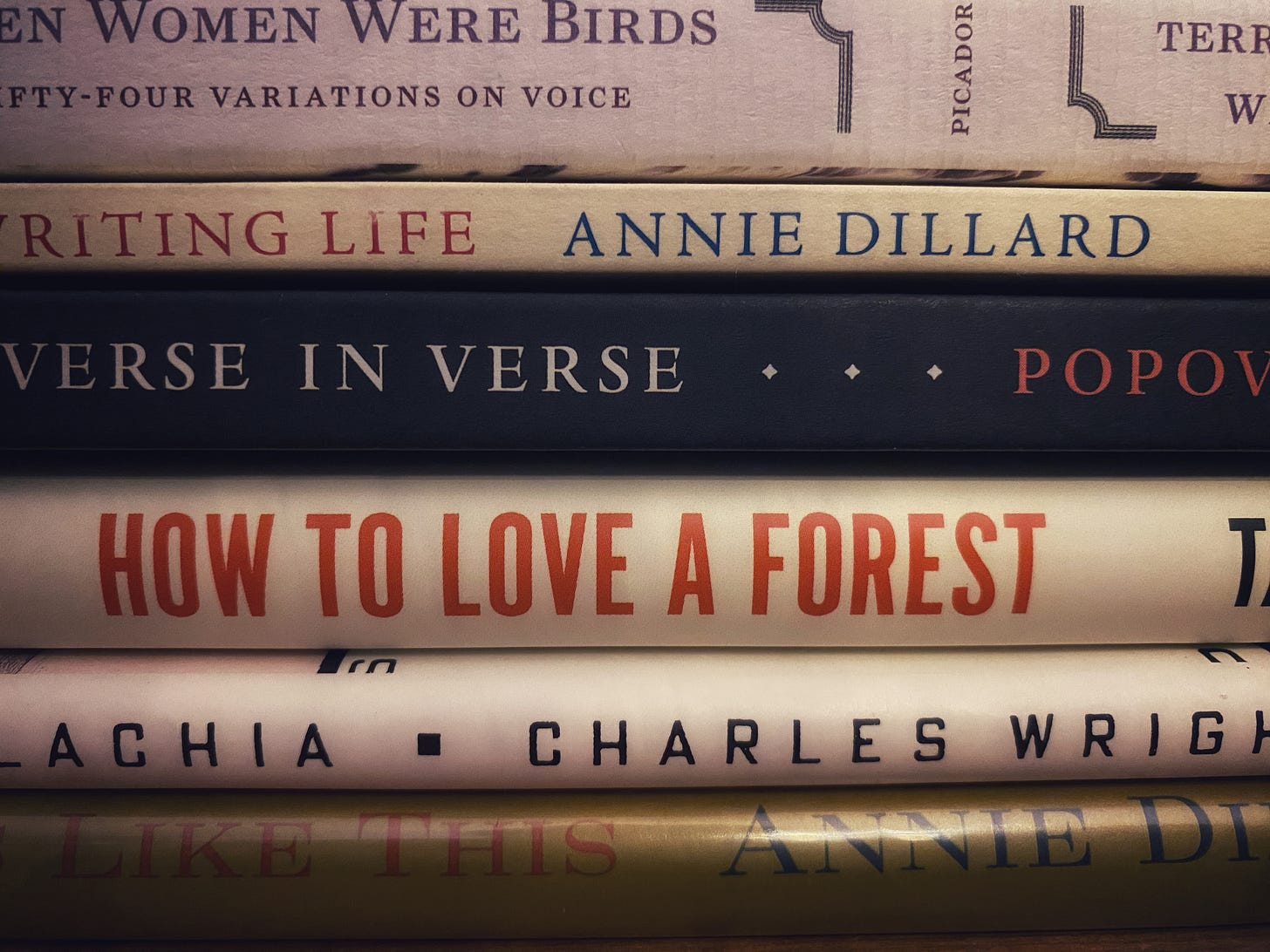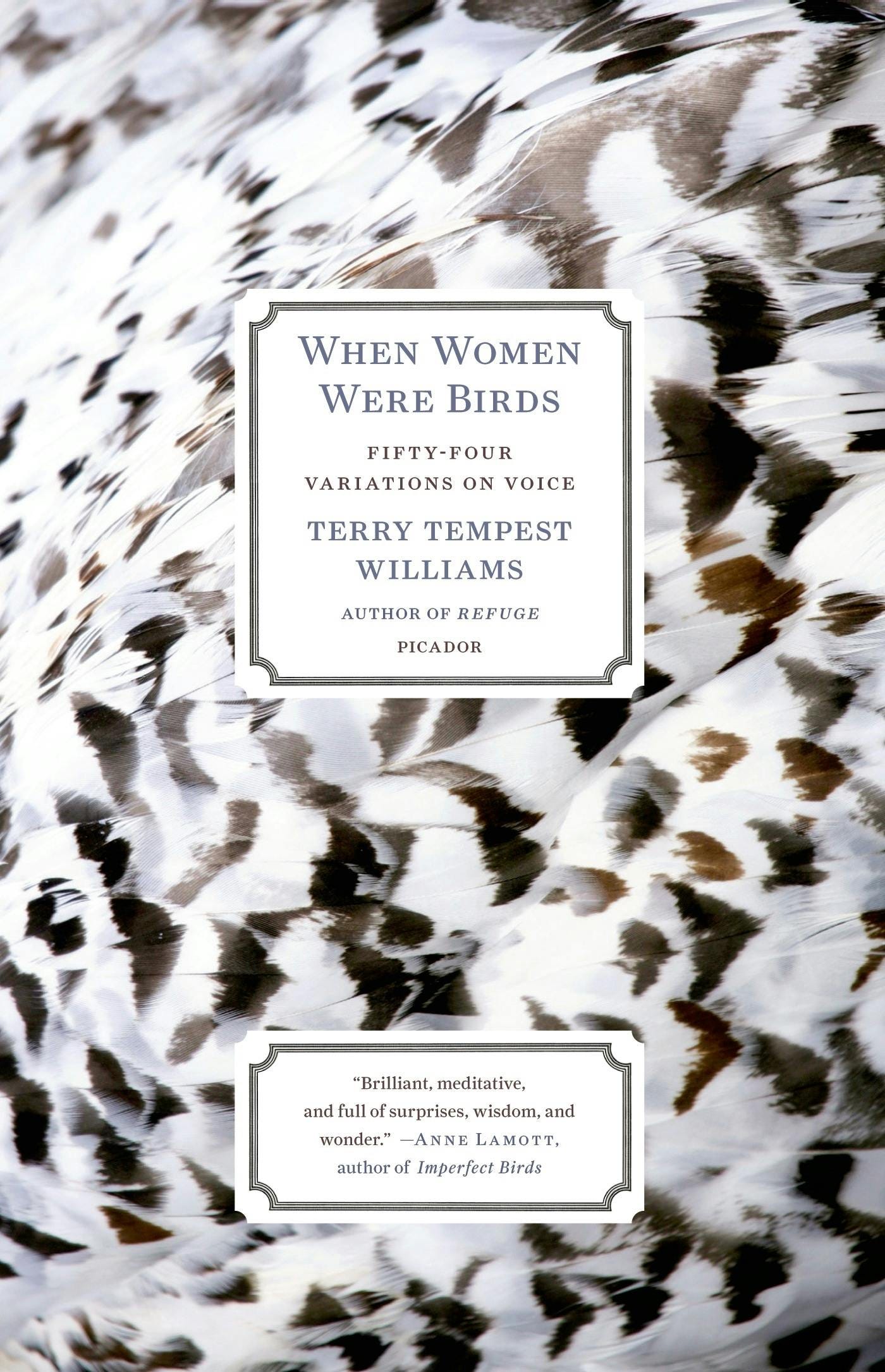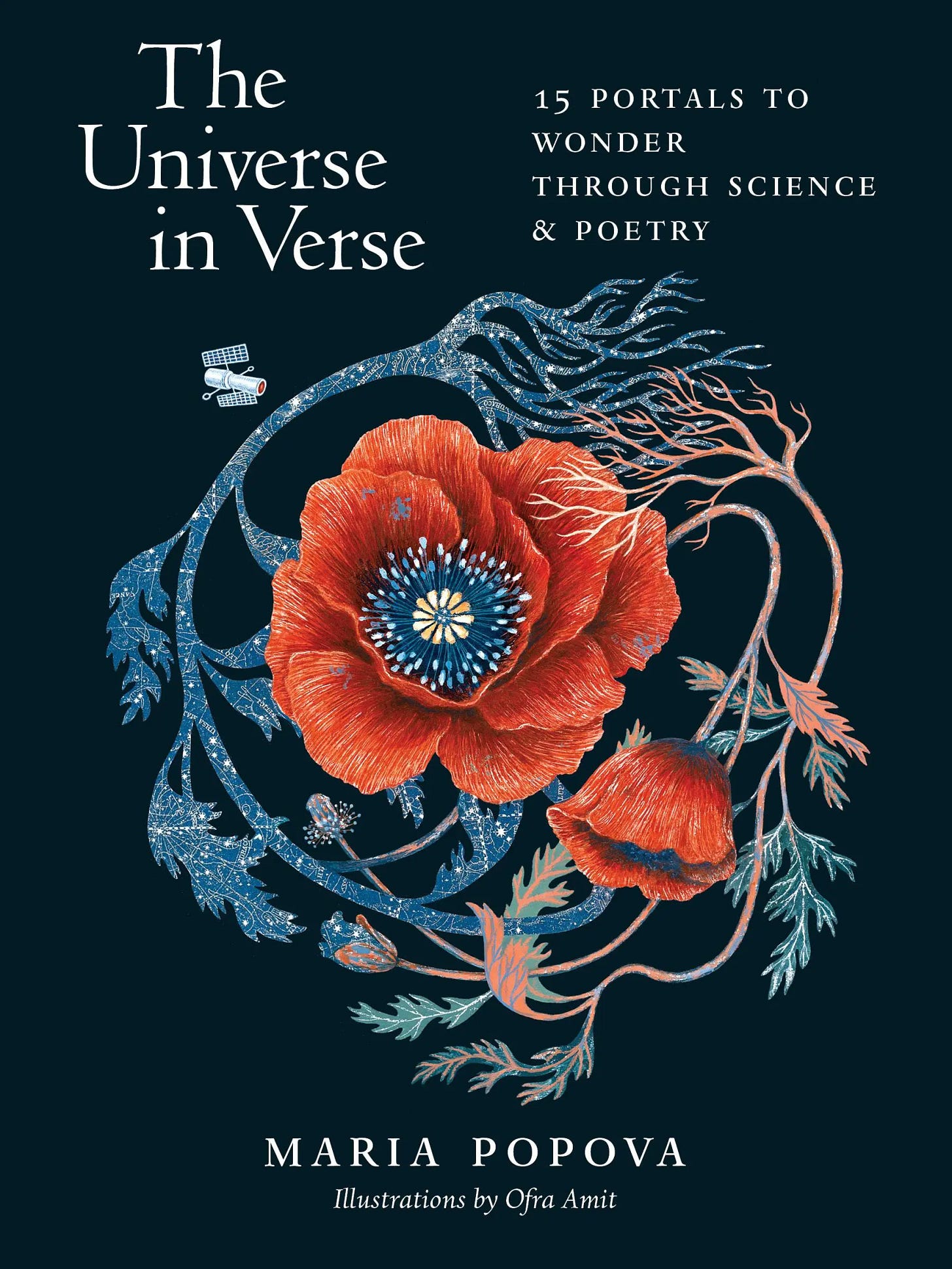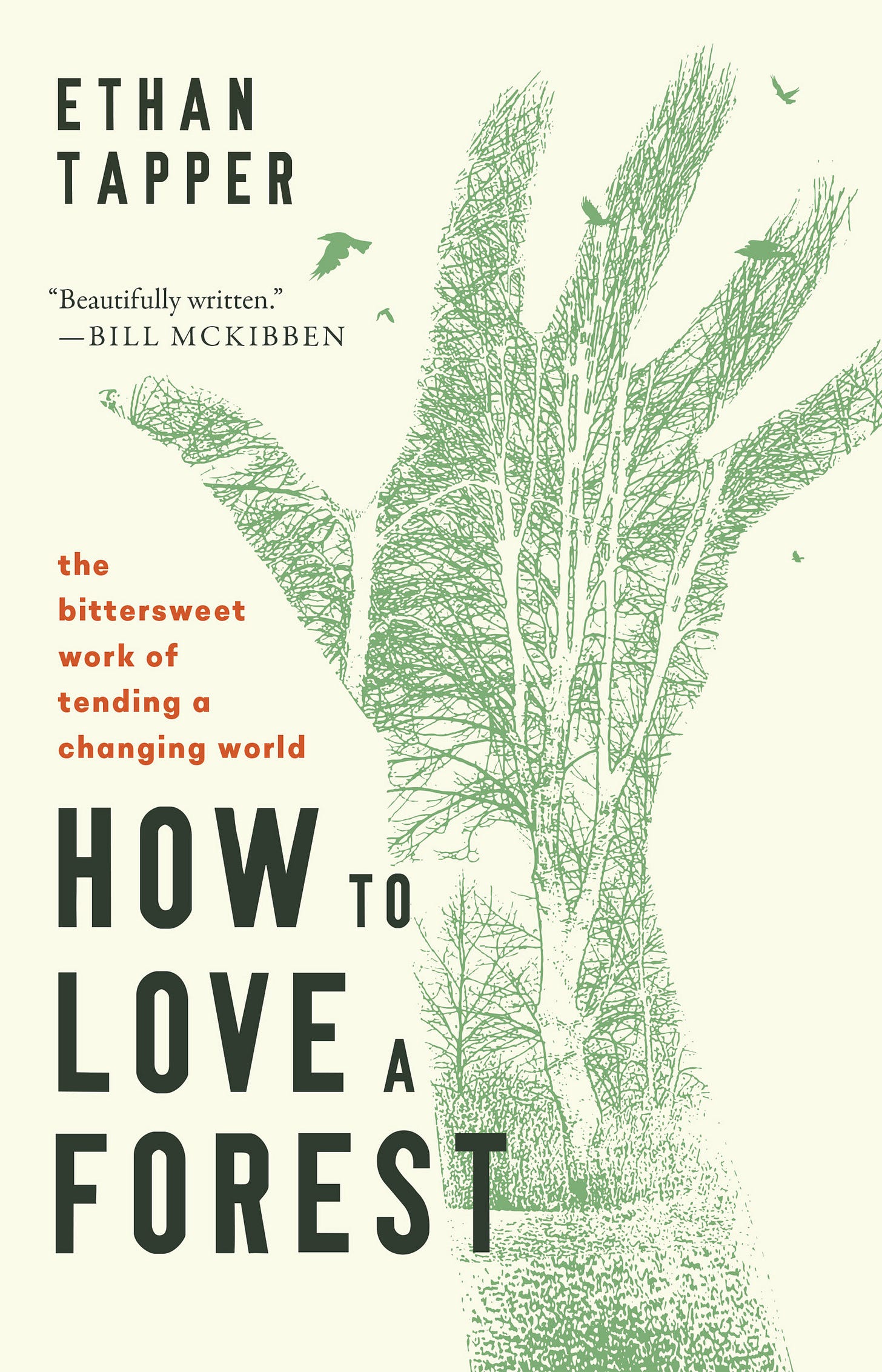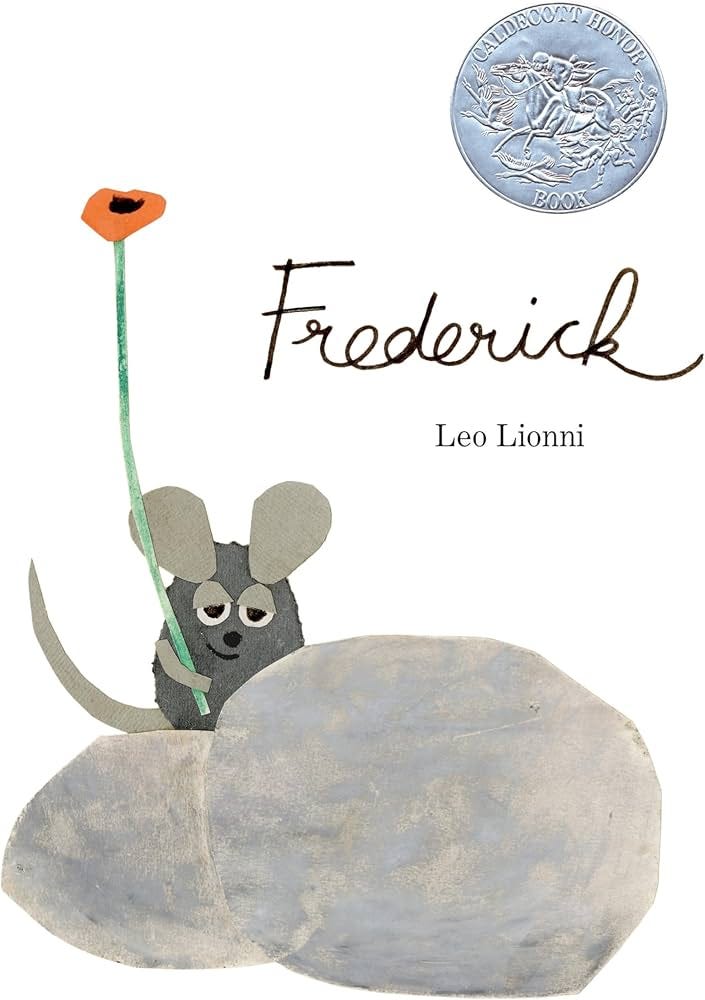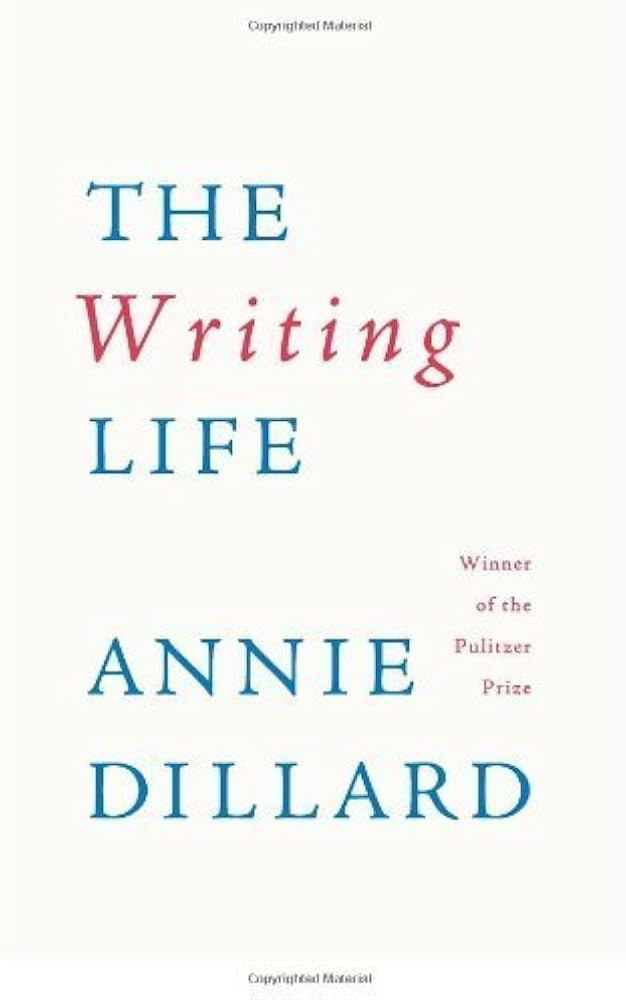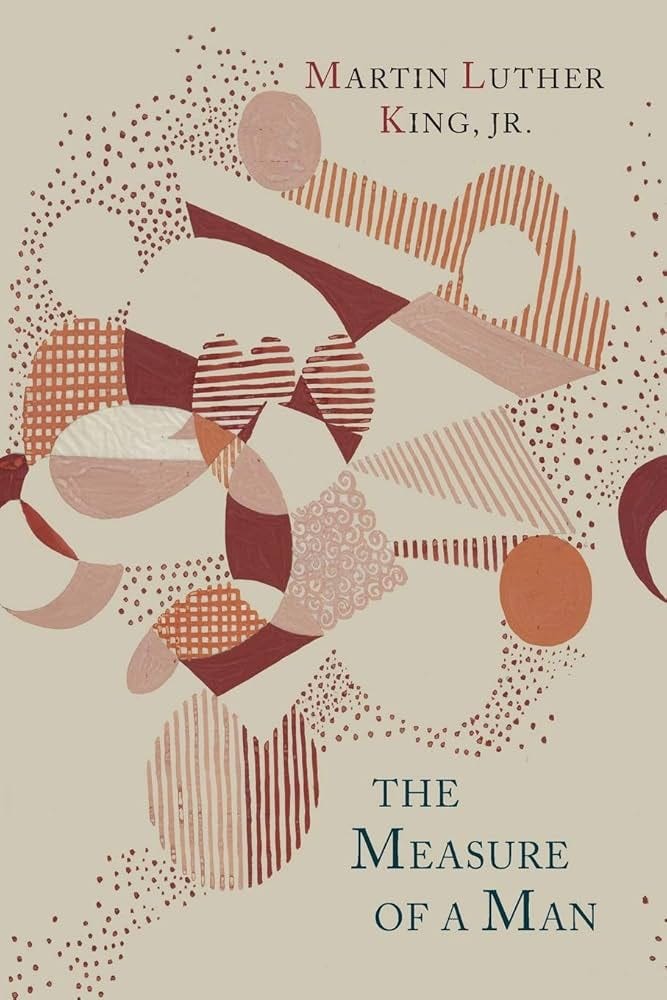Fumbling for a Light Switch in the Dark
Books I read in February
When Women Were Birds by Terry Tempest Williams
To think about Terry Tempest Williams is to think about Utah, red rock, wolves howling, and a clan of one-breasted women—her maternal lineage. Williams, a long-time advocate for the environment, averts her gaze from the desert of her homebase to the blank pages of the journals her late mother have left her. Taking this as a sign, she decideed to write—in pencil—the narrative of her wise mother and use the opportunity to figure and flourish as a woman. This was a lovely book and while writing my daily poem, this book made an appearance in one of the stanzas. Here is an excerpt from my poem:
A woman once died, having left her journals to her daughter
and every page was a bank of blank, white snow.
Using a pencil, the daughter filled the journals
with feathers, beaks, talons, and pebble-filled narratives.
It was in Woodstock, NY that I bought the book.
The cashier, a mystic, fluttering and pecking around the shop,
understood the salt and ice of the author’s Utah
where the sun hammers on sand, ignites red stone.
The Universe in Verse: 15 Portals to Wonder Through Science & Poetry by Maria Popova
Maria Popova—my personal patron saint of intellectual curation, curiosity and wonder—has been championing the beauty and salt of living a life. Of her many projects was an event called The Universe In Verse where various artists and scientists gathered for a symposium to connect science to the arts. In this book, Popova’s scientifically wondrous essays are accompanied by the art and poetry of other curiosityphiles.
How to Love a Forest: The Bittersweet Work of Tending a Changing World by Ethan Tapper
Buy a mountain and see what happens. Traverse the steep trails. Revere the wolf tree. To own and love a mountain is for a chainsaw to be an extension of yourself. To own and love a mountain is to watch lightning and wind foil your work. To own and love a mountain is to create holes in the canopy and shoot streams of poison into innocent roots. In his book, Tapper writes “Freedom is a chainsaw, with the potential to be so many good and terrible things. We cannot choose if we will cut into the flesh of this biosphere, cannot choose whether or not our freedom will impact the freedom of others and of future generations. All that we can do is choose how we will live in the world that we have been given: if we will treat this earth like a mine or a garden, if we will exploit and because it or if we will turn toward relationship and responsibility and find a way to live with compassion.”
I will soon have the pleasure of meeting Tapper and possibly, maybe walking in woods with him.
Frederick by Leo Lionni
On most Tuesdays, I meet with friends in a coffee shop. Next to our cups of coffee are their watercolor and sketch essentials: petite palettes of paint, tiny vessels of water, brushes, pencils, and their little books in which they paint. I sit there in wonder, having brought nothing because I am not an artist in the same sense as they are. In fact, I always wonder why they invited me to join their little intimate group. The conversation is always fantastic. All of them are old enough to be my mother or grandmother and I love them deeply. Sometimes I feel like a small vessel of water there, absorbing all their colors. One of them—Denice—eased my thoughts by bringing up the story of a mouse named Frederick who didn’t do the same work as the other mice who were preparing for winter. Instead, he admired the land and skyscapes, sat around admiring the macro-and microcosms, pondered the leaf and the pebble. When winter eventually came, the mice were prepared to survive but the cold and darkness was rendering their minds dull. Frederick, his mind full of color, cloud, and an accumulation of narratives, told them stories and reminded them of the pebble, the leaf, and the vistas. The last time I met with the ladies, Denice had gifted me with the children’s book. I immediately read it.
The Writing Life by Annie Dillard
To write is to have a life of absurd wormdom. In her book, Dillard expresses what almost seems like disdain for wormdom. She goes on about the “wretched” inchworm poised on a grassblade throwing their head to-and-fro as if wailing What is life! Moving the inch of their bodies, they become a loop, connecting their front feet to their back feet only to eventually launch the front of their body into the void and ultimately fall again because of their own weight. Humans are similar pioneers of the void, our feet on the earth and our brains and reaches fumbling for a light switch in the dark. I laugh remembering how just last night, I walked into the dark bedroom at my in-law’s house. My knees pressed against the end of the bed for balance, I flailed my arms around in the dark, right and left, back and front, feeling for the light string in the dark. I still didn’t feel it, so I extended my arms further. This silly human dancing in the darkness for a string.
The Measure of Man by Martin Luther King, Jr.
The measure of man’s life is discovered through man’s self-thought, others-thought, and god-thought. One can be good with only the first two, but a joyous life is when both arms raise for God’s love.
Appalachia by Charles Wright
And Mr. Wright, also contemplating the contemptible worm: Little silkworm in its nonbeing and nothingness. Yet another reminder of my swaying and bobbing into the void.
And the beginning line of the poem “Body Language”: The human body is not the world, and yet it is. You may not be contemplating What is man but I always am. The tone within that question has of course changed to a more pained, disgusted one. In this book, the world beyond is contemplated and death, expected:
Until the cloud, and hush,
Until the left hedge and the right hedge, the insects and short dogs,
The back porch and barn swallows grain-out and disappear.
Until the bypass is blown with silence, until the grass grieves.
Until there is nothing else.
Mornings Like This: Found Poems by Annie Dillard
Dillard consulted books, baseball stats, and manuals in search of the magic and voices in their narratives. She curated these certain voices, line-and-stanza breaking them into poetry. In nearly every book of poems I read, it is the poems toward the very end that I love most. And speaking of endings, the final poem is a collection of final words collected from a book called Dictionary of Last Words. Here is a stanza:
So here it is at last, the distinguished thing!
Is this dying? Is this all? Is this
All that I feared, when I prayed against a hard death?
O! I can bear this! I can bear it!
Now I have finished with all earthly business
--High time, too. Yes, yes,
My dear child, now comes death.
Is it come already? Here, here is my end.
Wait a moment. Do you not hear the voices?
And the children’s are the loudest! The chariots
And horses! I do not know how this happened.
I can account for it in no way.


